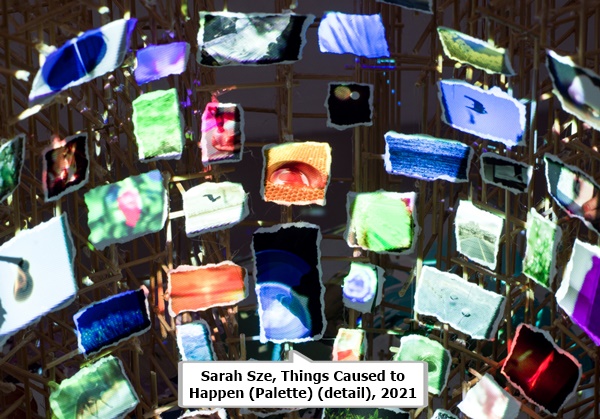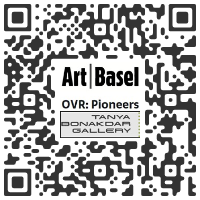Olafur Eliasson, Susan Philipsz, Tomás Saraceno, Sarah Sze

Tanya Bonakdar Gallery
521 West 21st Street New York, NY 10011t: 323 380 7172 e-mail:
Multiple location : New York NY Los Angeles CA




Art Basel
Messe Basel Messeplatz 10 4005 Basel Switzerland+41 79 739 35 38 e-mail:
March 24 > 27, 2021

Pushing the boundaries of traditional medium and expanding the limits of their practice, Olafur Eliasson, Tomás Saraceno, Susan Philipsz and Sarah Sze are visionaries in the innovation of medium, social engagement and conceptual thought.
Throughout the past two and a half decades, Olafur Eliasson’s sculptures, installations, paintings, photography, films, and public projects have served as tools for exploring the cognitive and cultural conditions that inform our perception. Influenced by our complex relationship to nature, Eliasson’s installations often use natural phenomena – such as light, water and mist – to heighten our understanding of the way we perceive and co-produce the world around us. His interests in renewable energy and climate action form an integral part of his practice.
Over the past two decades, Susan Philipsz has explored the psychological and sculptural potential of sound. The artist's immersive environments of architecture and song heighten the visitor’s engagement with their surroundings while inspiring thoughtful introspection. Recordings of Philipsz’s own breath or voice are often embedded within forms that have specific acoustic properties, most recently industrial steel barrels and reconstructed organ pipes. While the source material for each piece is distinct, the storylines and references are often recognizable, exploring familiar themes of loss, longing, hope, and return. These universal narratives trigger personal reactions while also temporarily bridging the gaps between the individual and the collective, as well as interior and exterior space.
Tomás Saraceno’s multidisciplinary practice takes inspiration from a variety of sources ranging from architecture and space exploration to science fiction and geometries found in the biological sciences. Among these subjects, Saraceno has long included arachnology as a tool for the investigation of alternative constructions. For Saraceno, spiderwebs spark inquiry into possible modes to redefine relationships between humans and nature, proposing utopian conditions for sustainable societies. A pioneer in this medium, Saraceno studies the complex interwoven geometries suspended in air, each structure appearing as a unique galaxy floating within an expansive, infinite landscape. Building on the world of natural sciences, Saraceno’s floating sculptures propose new, sustainable ways of inhabiting the environment. Embodying one of the core concepts in Saraceno's work, this sculptural work presents a model of life floating in space and suggests an architectural vision of the future.
Over the past two decades, Sarah Sze has challenged the static nature of sculpture, creating constellations of objects, activities, and cataclysmic moments that convey the essence of a new world overwhelmed by fragments of information. Known for her inimitable landscapes that blur the boundaries between sculpture, installation, and painting, Sze explores how materials convey meaning and a sense of loss through entropy and absence. Her iconic structures often reference scientific tools, such as pendulums and built models, that attempt to trace space and time, exploring the edge of human perception. In these often whimsical and mysterious object-compositions, Sze makes use of everyday functional tools and found elements—scraps of archival prints, toothpicks, stone, tape and cardboard—to create re-appropriated settings that challenge the viewer’s preconception of the familiar and mundane
Throughout the past two and a half decades, Olafur Eliasson’s sculptures, installations, paintings, photography, films, and public projects have served as tools for exploring the cognitive and cultural conditions that inform our perception. Influenced by our complex relationship to nature, Eliasson’s installations often use natural phenomena – such as light, water and mist – to heighten our understanding of the way we perceive and co-produce the world around us. His interests in renewable energy and climate action form an integral part of his practice.
Over the past two decades, Susan Philipsz has explored the psychological and sculptural potential of sound. The artist's immersive environments of architecture and song heighten the visitor’s engagement with their surroundings while inspiring thoughtful introspection. Recordings of Philipsz’s own breath or voice are often embedded within forms that have specific acoustic properties, most recently industrial steel barrels and reconstructed organ pipes. While the source material for each piece is distinct, the storylines and references are often recognizable, exploring familiar themes of loss, longing, hope, and return. These universal narratives trigger personal reactions while also temporarily bridging the gaps between the individual and the collective, as well as interior and exterior space.
Tomás Saraceno’s multidisciplinary practice takes inspiration from a variety of sources ranging from architecture and space exploration to science fiction and geometries found in the biological sciences. Among these subjects, Saraceno has long included arachnology as a tool for the investigation of alternative constructions. For Saraceno, spiderwebs spark inquiry into possible modes to redefine relationships between humans and nature, proposing utopian conditions for sustainable societies. A pioneer in this medium, Saraceno studies the complex interwoven geometries suspended in air, each structure appearing as a unique galaxy floating within an expansive, infinite landscape. Building on the world of natural sciences, Saraceno’s floating sculptures propose new, sustainable ways of inhabiting the environment. Embodying one of the core concepts in Saraceno's work, this sculptural work presents a model of life floating in space and suggests an architectural vision of the future.
Over the past two decades, Sarah Sze has challenged the static nature of sculpture, creating constellations of objects, activities, and cataclysmic moments that convey the essence of a new world overwhelmed by fragments of information. Known for her inimitable landscapes that blur the boundaries between sculpture, installation, and painting, Sze explores how materials convey meaning and a sense of loss through entropy and absence. Her iconic structures often reference scientific tools, such as pendulums and built models, that attempt to trace space and time, exploring the edge of human perception. In these often whimsical and mysterious object-compositions, Sze makes use of everyday functional tools and found elements—scraps of archival prints, toothpicks, stone, tape and cardboard—to create re-appropriated settings that challenge the viewer’s preconception of the familiar and mundane
 |
Olafur Eliasson |
 |
Susan Philipsz |
 |
Tomás Saraceno |
 |
Sarah Sze |
mpefm
SWITZERLAND fair art press release
Online VIEWING ROOM

Online VIEWING ROOM
QR of this press release
in your phone, tablet








